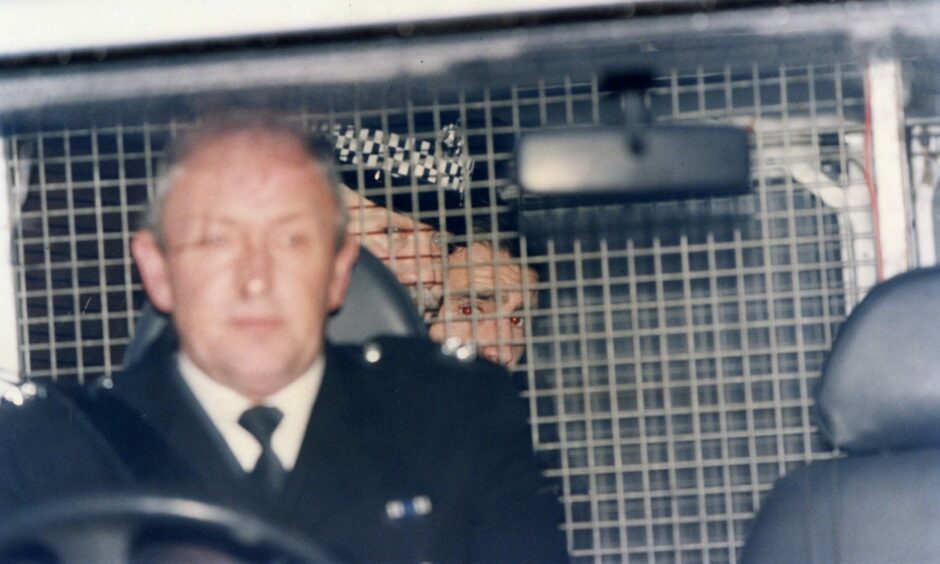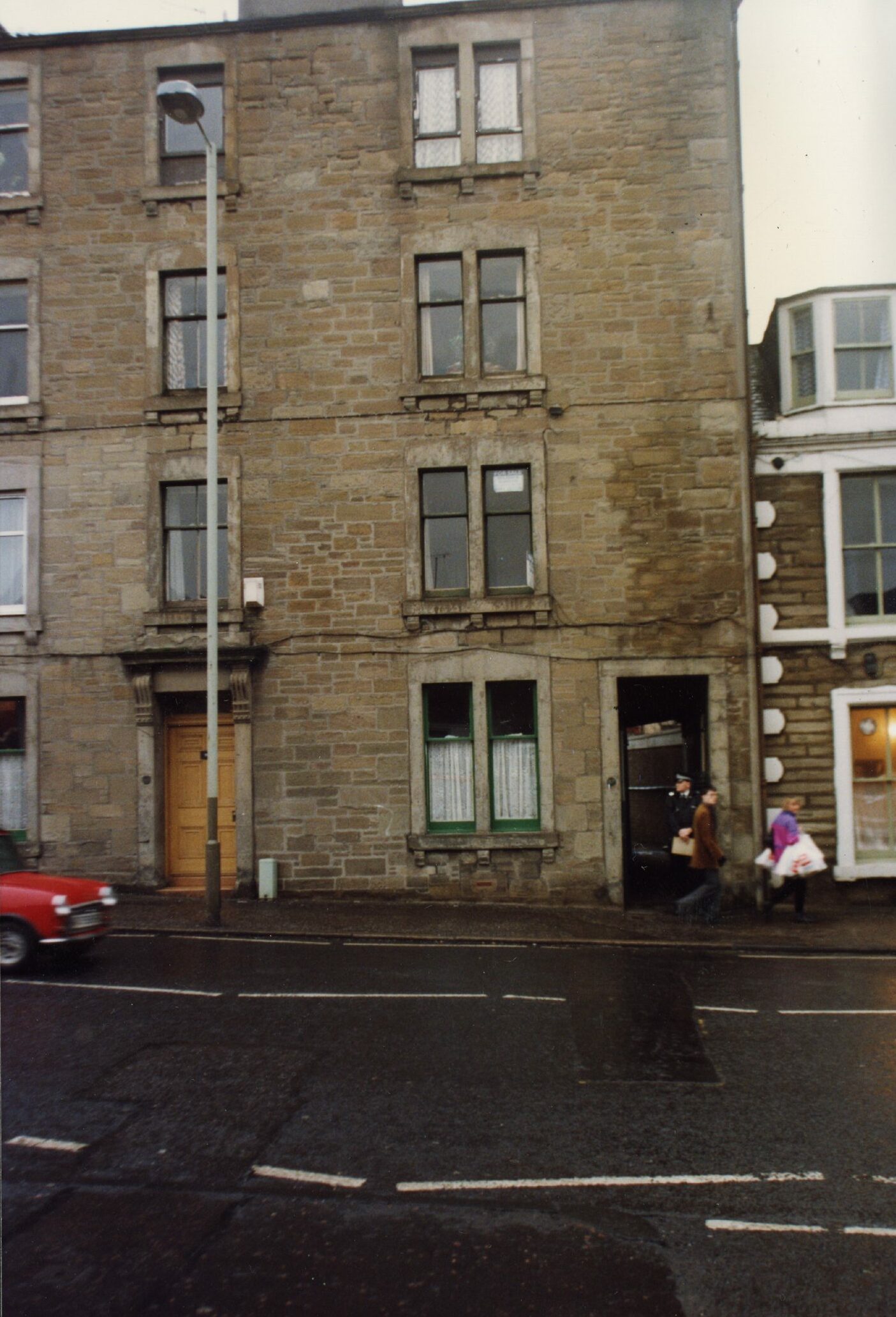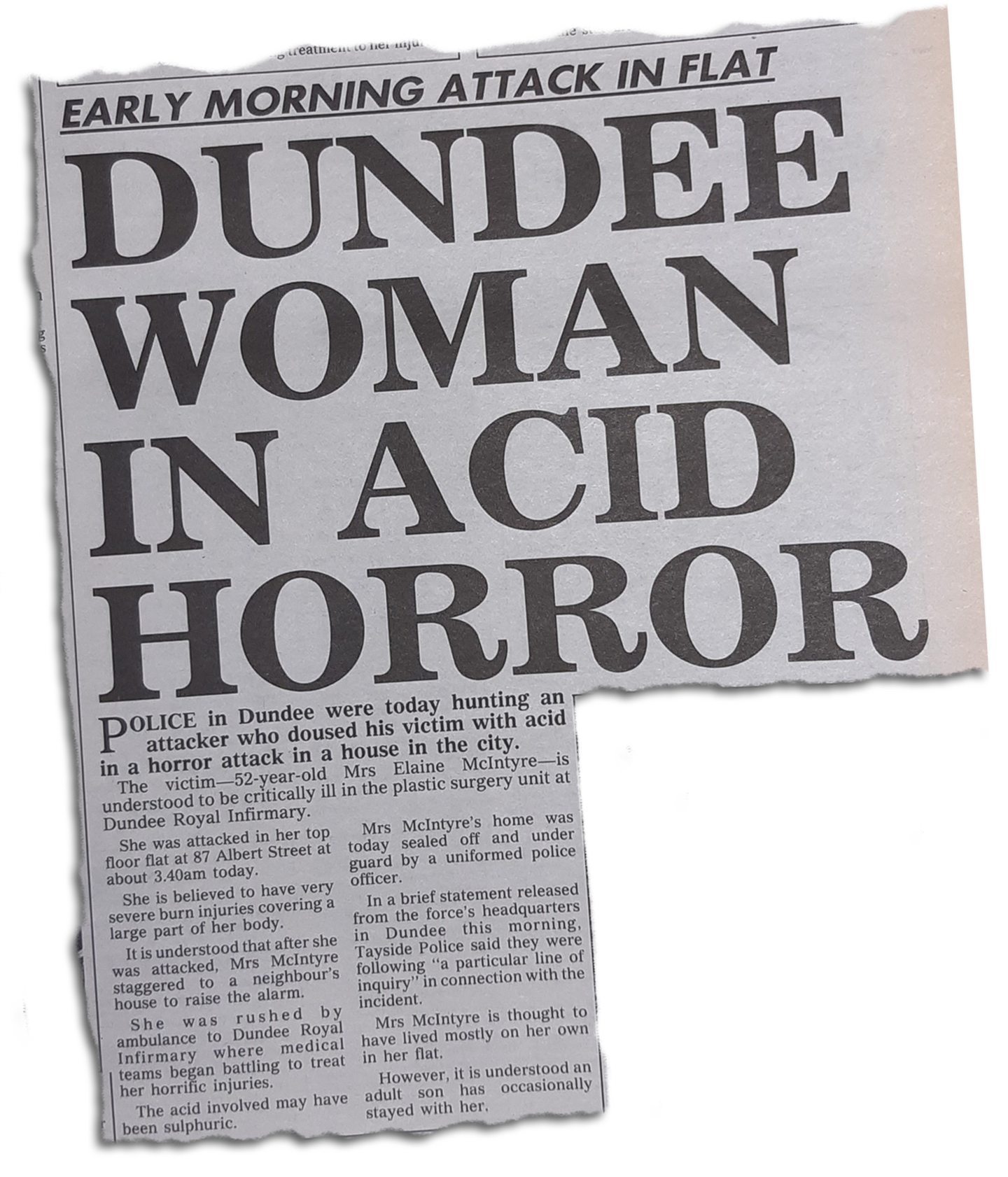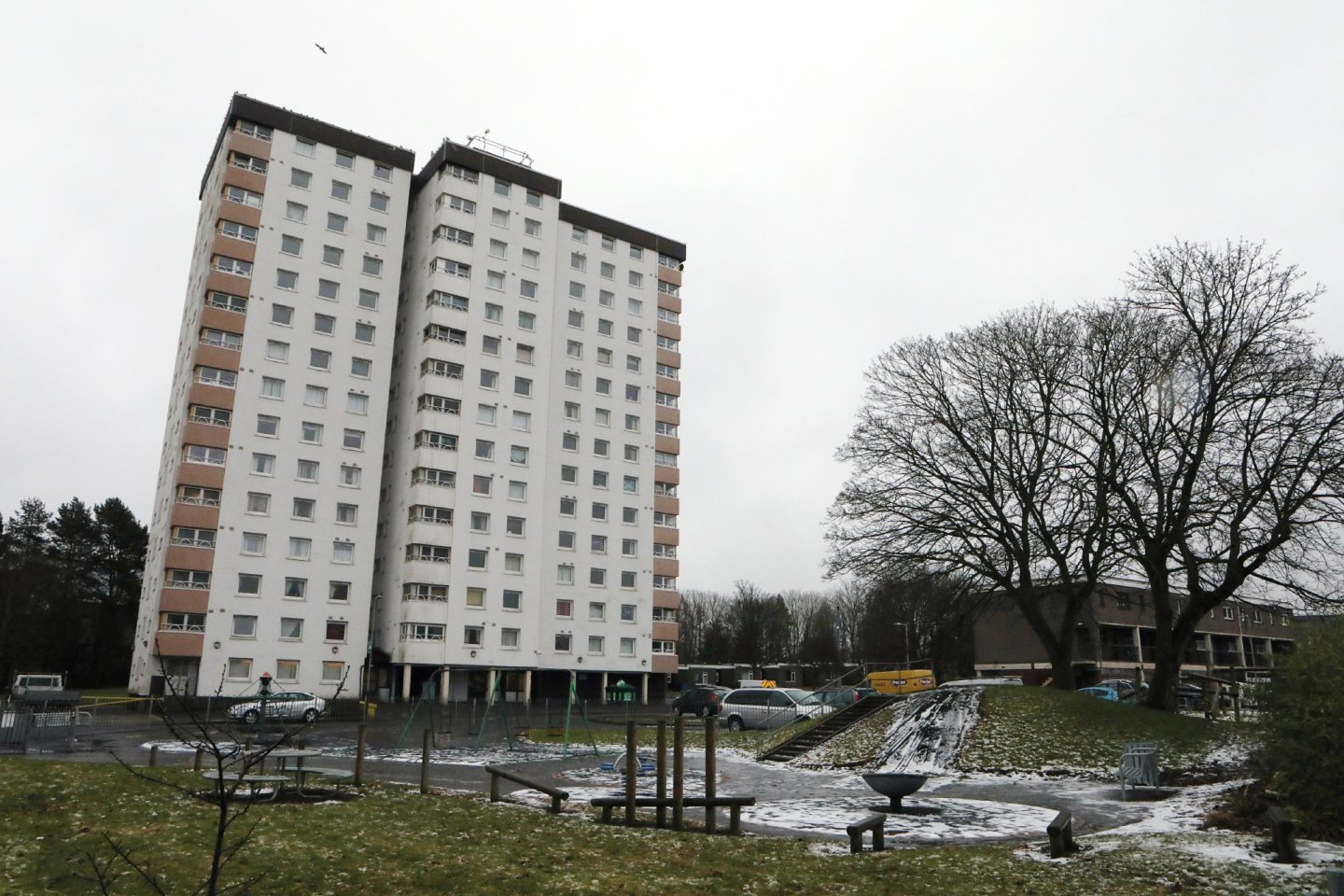
“I have had an accident and I am covered from head to toe with acid.”
Elaine McIntyre staggered from her top floor flat in Dundee’s Albert Street to call for help after being left with appalling burns covering 70% of her body in September 1993.
But this was no accident.
The 53-year-old remained lucid — despite the agony — and when an ambulance arrived she told one of the crew what had happened: “It was my son — he’s a maniac.”
She died the following day — leaving behind a deathbed confession.
It was an act of such brutality that left even hardened detectives in disbelief.
What happened 30 years ago?
Douglas Murray McIntyre was 27-years-old when he attacked his mother.
McIntyre, whose parents had been divorced for 12 years, stayed with a girlfriend in London but made regular trips home to visit his mother and his father.
On his last trip home he found Jack Findlay was the new man in his mum’s life.
Most accounts say he didn’t approve.
His mum went out drinking with Findlay at the local pub on the evening of Wednesday September 22 and they arrived home at midnight to find her son in the flat.
McIntyre attacked the new man, after a brief exchange of angry words, punching and even biting him, before he managed to escape with an ear wound and broken ribs.
Findlay took a taxi to Dundee Royal Infirmary.
McIntyre told his mum: “I should have thrown him out of the window.”
Worse was to follow.
Angry, drunk McIntyre, punched and kicked his mother before walking to the hall cupboard and grabbing a plastic container of drain cleaner.
It was 93% sulphuric acid.
He poured it all over her as she writhed in pain on the floor.
McIntyre put the container back in the cupboard — then walked away.
Seemingly without a care in the world.
Mrs McIntyre was left to stumble in agony to a downstairs neighbour.
She called for help and police arrived before the ambulance did.
Detective Sergeant Ian Flynn was there at 3.50am.
He asked her who had assaulted her and she said “something about it being her son”.
He went up to Mrs McIntyre’s flat after she was taken away by ambulance.
There was only one suspect — but he was nowhere to be found.
There were burn marks on the carpet
In a cupboard he found a plastic container which had an orange skull and crossbones on it and the words “sulphuric acid 93 percent” and “toxic and corrosive liquids” on it.
Death was inevitable given her injuries.
But Mrs McIntyre amazingly made a dying declaration that morning.
She was heavily bandaged and attached to drips but was conscious and able to give a detailed statement to DS Douglas Gray as she lay in Ninewells Hospital.
She said: “He doesn’t like me going out with men so when he came into the house and found Jack he assaulted him and punched him and kicked him.
“Jack got the police.
“Both Jack and Murray left the house.
“Jack never came back but Murray did — he asked me why I was going with Jack and I told him it was because he was good and kind-hearted.
“Murray said I should get rid of him and started punching and kicking me.
“He knocked me down and kicked me a few times in the ribs.
“I was in the bedroom at the time and I told him to stop hitting me.
“He then went to the cupboard in the lobby and brought out a container.
“I got it from Craigie High School — they use it to clean drains out.
“I got it because the sink was choked up.
“It’s been lying in the cupboard for about four years.
“Murray knew it was in the cupboard.
“When he came back to the bedroom I was either lying down there or in the lobby.
“He got the container out of the cupboard and poured it over me while I was lying down.
“I told him it was strong stuff but he kept putting it over me.
“He did not say anything to me when he was pouring the stuff over me.
“He was drunk.”
Mrs McIntyre had to stop frequently to take a drink of water as she was dehydrated.
When the nurse read the statement back to her she tried to sign it.
But she was unable to do so because of the bandages.
McIntyre sniggered to police
McIntyre was traced to a house in Baxter Street and charged with attempted murder.
Asked if he had anything to say he said: “Did she put in for criminal injuries?”
He then let out a small laugh.
His mum died the following morning and he was charged with murder.
McIntyre replied to caution and charge: “She was okay when I left the house.
“I can’t remember pouring anything on her or anything like that.”
McIntyre denied the allegation when he appeared for trial before a jury of six women and nine men at the High Court in Perth in January 1994.
His mother’s dying declaration however would help confirm her son’s guilt.
Professor Derrick Pounder, professor of forensic medicine at Dundee University, said the cause of death was chemical burns which had covered 70% of her skin.
“No-one could have survived,” he said.
“She had no chance.”
Crown counsel Paul Cullen submitted it was clear McIntyre had gone berserk and smashed up his mother’s flat before committing a “callous, ghastly and horrific crime”.
“The Crown does not have to establish motive, but here there is a motive — irritation and aggravation at his mother’s relationship with Mr Findlay,” he said.
The jury unanimously found him guilty of assaulting Mrs McIntyre’s boyfriend.
But on the matter of “throwing or pouring concentrated sulphuric acid”, the jury was split and they returned a majority verdict — not guilty of murder but guilty of culpable homicide.
Edgar Prais QC, defending McIntyre, said one had to go on the assumption that the jury had taken the view that the quality of the assault had neither the intention to kill nor the wicked recklessness which fashioned the ingredients for murder.
McIntyre, who did not give evidence, was said to have had two pages of previous convictions for a variety of offences including breach of the peace and misuse of drugs.
Lord Morton told McIntyre: “It must have been a deliberate attempt to impose a very severe injury on your mother and this is a very dangerous and serious offence.
“In my opinion it deserves a very harsh sentence.”
Lord Morton took a tough stance
To gasps from the public gallery, he jailed him for 20 years for killing his mother and two years for the assault on Mr Findlay, with the sentences to run concurrently.
Before sending him down, he said: “He will have to spend the rest of his life in the knowledge that the mother he loved and who loved him died at his hands in these horrible circumstances.”
McIntyre’s legal team argued that the sentence didn’t give proper recognition to the difference between a conviction for murder and one for culpable homicide.
The appeal succeeded and his sentence was reduced to 14 years.
He got out, eventually, in the new millennium but was never far from trouble.
As recently as April 2013 he was back in the city’s sheriff court for spitting at a man despite knowing he was carrying Hepatitis C.
That particular charge was still hanging over him when he was found dead in the early hours of August 20 2013 in a Lochee multi-storey flat in Burnside Court.
There were no suspicious circumstances.
He was 47.
McIntyre had made front page headlines again.
For the last time.




